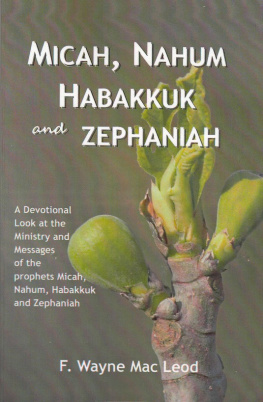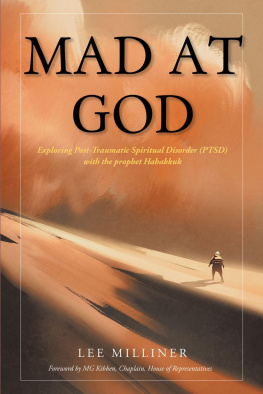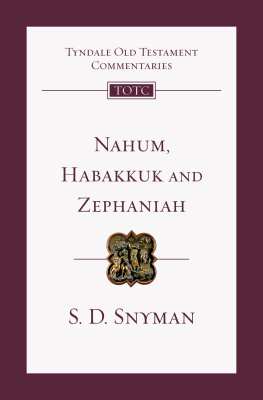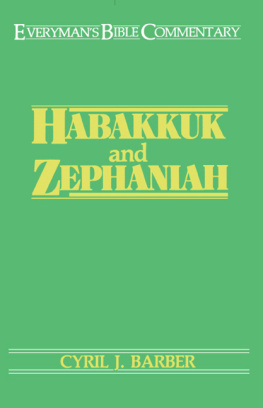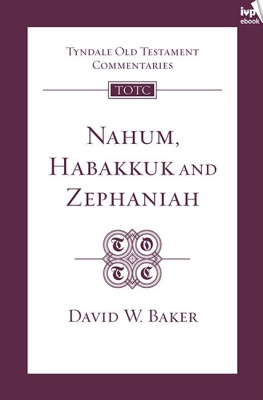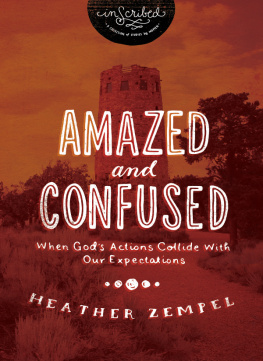HABAKKUK
The Cry of Crisis
The Song of Victory
Lucille Anderson

Copyright 2016 Lucille Anderson.
All rights reserved. No part of this book may be used or reproduced by any means, graphic, electronic, or mechanical, including photocopying, recording, taping or by any information storage retrieval system without the written permission of the author except in the case of brief quotations embodied in critical articles and reviews.
Unless otherwise noted, Scripture taken from the New King James Version. Copyright 1979, 1980, 1982 by Thomas Nelson, Inc. Used by permission. All rights reserved.
WestBow Press
A Division of Thomas Nelson & Zondervan
1663 Liberty Drive
Bloomington, IN 47403
www.westbowpress.com
1 (866) 928-1240
Because of the dynamic nature of the Internet, any web addresses or links contained in this book may have changed since publication and may no longer be valid. The views expressed in this work are solely those of the author and do not necessarily reflect the views of the publisher, and the publisher hereby disclaims any responsibility for them.
Any people depicted in stock imagery provided by Thinkstock are models, and such images are being used for illustrative purposes only.
Certain stock imagery Thinkstock.
Certain imagery Shutterstock
ISBN: 978-1-5127-4066-0 (sc)
ISBN: 978-1-5127-4068-4 (hc)
ISBN: 978-1-5127-4067-7 (e)
Library of Congress Control Number: 2016907066
WestBow Press rev. date: 5/11/2016

To my par ents,
Louise Grubbs Harr ison,
who instilled in me a love for reading and lear ning,
and
Monroe Harr ison,
who taught me how to love the Lord and
to stay true to my cal ling

Contents
Welcome to your journey through Habakkuk: The Cry of Crisis The Song of Victory . I know that we will enjoy our time together as we learn and grow.
Before you jump into the study of Habakkuk, please take a few moments to read about the study format, which I term From Conceptualization to Cognition. It is the same format that I will be using in future Bible studies, so once you learn the how to, you will have it down for the next time. But more importantly, it will allow you to get the greatest benefit and blessing for your time studying the book of Habakkuk.
This prophetic book begins with the prophet crying out and pleading with God about the crisis of the state of the nation of Judah that is all around him, which impacts his and others personal lives. As he cries out to God, and then has a personal encounter with the Divine, we witness the prophet being moved and transformed from a state of panic and crisis to victory.
That is the intent of this lesson for your life and what this study format is designed to accomplish. After becoming familiar with the format, delve into the study. There are nine lessons, but dont feel you must complete them in nine sessions; you may take longer, but dont do more than one lesson in a sitting. Take your time and go at a pace that is comfortable for you. The main thing is to open up to grasp the spiritual transformation that will be taking place in your life and situation. If you get to the end of a concept and dont feel you have indeed moved from concept to cognition, go back through to determine what you may have missed. Most importantly, be present in the moment as God moves you from crisis to victory.
Study Forma t
From Conceptualization to Cognition
This study of Habakkuk is designed for you to achieve more than knowledge of the life and times of the prophet. It is designed to take you beyond knowing the movement and message of the prophetic book. The purpose of this format, From Conceptualization to Cognition, is to allow the student to share in the spiritual and emotional experience of Habakkuk in his time of crisis. It guides you through Habakkuks encounter with God and your own encounter with the Divine as you are going through your own crisis experience.
As you move with Habakkuk, you will learn how to experience and process your crisis moments, how to allow your relationship with God to engage you for grace and growth, and how to allow your faith to become a living a faith. The Conceptualization to Cognition format will teach you how to follow Habakkuks movement from crisis to victory.
The terms conceptualization and cognition are defined and explained below in order to help you maximize your study experience. Cognitive behavioral therapy (CBT) is one of the therapeutic techniques of the discipline of psychology. The premise of CBT is that a persons beliefs affect their emotions, which affect their behavior. Although I have borrowed the term cognition from a therapeutic technique, this study is by no means therapeutic, but the process of moving from crisis to victory will follow the premise of CBT. More succinctly, the principles of CBT could well have been adopted from Romans 12:2: And do not be conformed to this world, but be transformed by the renewing of your mind that you may prove what is that good and acceptable and perfect will of God.
Conceptualization is the ability to formulate a Concept. A Concept is an abstract idea or general notion about something according to the Oxford Dictiona ry.
For many of us, and I know for me, the Scriptures were a concept, or even a clich, for many years. We often have a general idea or understanding of the Word based mostly on what weve been taught at home or in Sunday school. Those of us who are Christians have accepted Gods Word on faith, but it was only as we are going through our own experiences, trials, and questioning that we are able to appropriate the sacred text to our life, interpret what we are going through in light of the Scriptures, and then analyze what we understood or believed after the fact, based on how God responded to the life situation. What do you really believe about God in your heart of hearts, not what weve been told to believe or what your church doctrine is? Do you really believe what the Scriptures say, that the Word is living? Or do only believe that it is good preaching material, soulful, liturgical literature, or pious prose and poetry? What are your benefits as a result of being in Him, and do you know how to appropriate those benefits? This is not a process for wimps, and it might make you uneasy to go through this process if your faith is shaky. But if you will submit yourself to this process, you will be blessed as you move from conceptualization to cognition .
Cognition is the mental action or process of acquiring knowledge and understanding through thought, experience, and the senses.
If you have or will allow yourself to go through the process of conceptualizing above, it is time to think and ponder what you have experienced about yourself and about God and His Word. You should then weigh what you think against what the Word of God says, and hopefully, this will bring you to a state of knowing what you believe about God and His Word. I now know , not just believe , but know , that God will supply all of my need according to His riches in glory by Christ Jesus (Philippians 4:19) because of how He took care of me when I had no income and no help. This process of moving from conceptualizing to cognition is the process God took me through during that time, and He wants to do the same for you. You will also come to a cognitiona knowing of how God feels about you and how special you are to Him even if He doesnt give that thing you feel you need or doesnt answer your prayer the way you wish.
Next page




